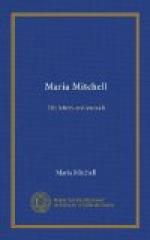Miss W., a teacher at Vassar, was fretting at being obliged to attend chapel exercises twice a day when she needed the time for rest and recreation, and applied to Miss Mitchell for help in getting away from it. After some talk Miss Mitchell said: “Oh, well, do as I do—sit back folding your arms, and think of something pleasant!”
“Sunday, Dec. 18, 1866. We heard two sermons: the first in the afternoon, by Rev. Mr. A., Baptist, the second in the evening, by Rev. Mr. B., Congregationalist.
“Rev. Mr. A. took a text from Deuteronomy, about ‘Moses;’ Rev. Mr. B. took a text from Exodus, about ‘Moses;’ and I am told that the sermon on the preceding Sunday was about Moses.
“It seems to me strange that since we have the history of Christ in the New Testament, people continue to preach about Moses.
“Rev. Mr. A. was a man of about forty years of age. He chanted rather than read a hymn. He chanted a sermon. His description of the journey of Moses towards Canaan had some interesting points, but his manner was affected; he cried, or pretended to cry, at the pathetic points. I hope he really cried, for a weakness is better than an affectation of weakness. He said, ‘The unbeliever is already condemned.’ It seems to me that if anything would make me an infidel, it would be the threats lavished against unbelief.
“Mr. B. is a self-made man, the son of a blacksmith. He brought the anvil, the hammer, and bellows into the pulpit, and he pounded and blew, for he was in earnest. I felt the more respect for him because he was in earnest. But when he snapped his fingers and said, ’I don’t care that for the religion of a man which does not begin with prayer,’ I was provoked at his forgetfulness of the character of his audience.
“1867. I am more and more disgusted with the preaching that I hear!... Why cannot a man act himself, be himself, and think for himself? It seems to me that naturalness alone is power; that a borrowed word is weaker than our own weakness, however small we may be. If I reach a girl’s heart or head, I know I must reach it through my own, and not from bigger hearts and heads than mine.
“March, 1873. There was something so genuine and so sincere in George Macdonald that he took those of us who were emotional completely—not by storm so much as by gentle breezes.... What he said wasn’t profound except as it reached the depths of the heart.... He gave us such broad theological lessons! In his sermon he said, ’Don’t trouble yourself about what you believe, but do the will of God.’ His consciousness of the existence of God and of his immediate supervision was felt every minute by those who listened....
“He stayed several days at the college, and the girls will never get over the good effects of those three days—the cheerier views of life and death.
“... Rev. Dr. Peabody preached for us yesterday, and was lovely. Everyone was charmed in spite of his old-fashioned ways. His voice is very bad, but it was such a simple, common-sense discourse! Mr. Vassar said if that was Unitarianism, it was just the right thing.




